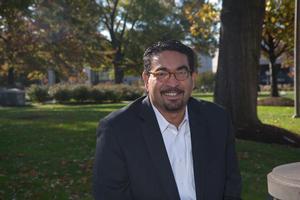Science
AU Professor Appointed New Program Director at National Science Foundation Saldanha will help oversee next generation of science research

Every day, American lives are improved through scientific breakthroughs and innovations: new medications, advanced cancer treatments, cleaner air and water, improved cybersecurity, more sustainable agriculture, and faster and safer transportation.
But how does all this research get funded?
One way is through the National Science Foundation (NSF), which provides one-fourth of all federal support to academic institutions for scientific and engineering research. NSF receives approximately 40,000 proposals each year. It funds around 11,000. It’s a rigorous and competitive process, and each proposal is evaluated by teams of leading experts in their fields.
This summer, AU Biology Professor Colin Saldanha will join one of these teams. He has been appointed a program director in the Neural Systems Cluster of the Division of Integrative Organismal Systems; Biological Sciences Directorate. In this role, he will work with three other directors to solicit, advise, and organize the review of all NSF grant neuroscience proposals.
“This is very exciting news. Dr. Saldanha is a premier behavioral endocrinologist, and his studies of the protective effects of estrogen on traumatic brain injury and other sources of neurodegeneration are known world-wide,” says Terry Davidson, director of American University’s Center for Behavioral Neuroscience. “His status as a scientist and his years of experience with grant evaluation for high-impact journals and agencies such as the National Institutes of Health make him a perfect choice for his new role.”
In Support of Good Science
At the National Science Foundation, Saldanha's team decides what research to support,” he says. “Our job is to look for good science and support it, because we are taking care of taxpayer money. Ultimately, we are working for the American taxpayers.”
At the National Science Foundation, Saldanha’s team will solicit proposals for neural system research—specifically, research on the nervous system’s organization, activation, and modulation. This type of research can have wide-ranging effects on our understanding of the nervous system and related diseases.
Saldanha’s team will put together scientific review panels of experts from across the country to evaluate each proposal. He and his team will oversee the work of the panels, evaluate their conclusions, and make recommendations about which projects should receive funding.
“This is how the NSF decides what research to support,” he says. “Our job is to look for good science and support it, because we are taking care of taxpayer money. Ultimately, we are working for the American taxpayers.”
Songbirds, Estrogen, and the Brain
At American University, Saldanha is a professor of biology and was recently the director of the undergraduate neuroscience major. His research focuses on neuroendocrinology, neuroscience, and neuroplasticity and how hormones interact. He has long studied songbirds in his lab, focusing on how the hormone estrogen can prevent brain inflammation in the birds’ brains. His work is paving the way for mammal studies, which could lead to groundbreaking human therapies to slow brain degeneration and inflammation.
Saldanha’s published research shows that estrogen can protect the brain of zebra finches from dangerous inflammation after traumatic injury. His findings may have future implications for recovery in humans after strokes, Parkinson’s disease, Alzheimer’s disease, and other neurological injuries. His most recent research, published last year in Scientific Reports, goes even further, suggesting that estrogen might also prevent neuroinflammation after viral and bacterial disease.
Saldanha will continue his research in his AU lab during his term at the National Science Foundation, and he will remain on the faculty at American University. “The appointment allows me two months per year to work on my own research,” he says. “And I’ll be here on campus every Friday to oversee research—and to check on the birds.”
Davidson says Saldanha’s appointment will highlight the work of AU professors and research. “In selecting Dr. Saldanha, the National Science Foundation brings recognition to American University as a place that has outstanding scientists as members of its faculty."
For Saldanha, the appointment is a great opportunity for himself, and also for the university. “It’s a way of stepping back from my little corner of science and looking at things from 20,000 feet,” he says. “It’s a wonderful opportunity to get a larger view of how things work and to bring back that knowledge to American University.”